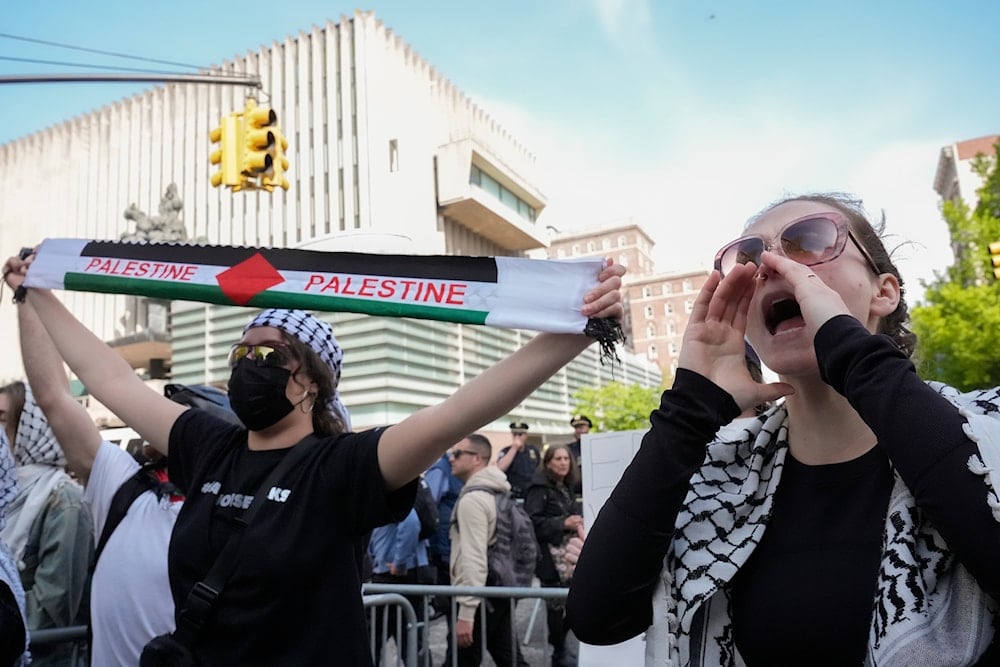Columbia university probes students for criticizing "Israel"
Some students believe the university’s crackdown may be reigniting the pro-Palestinian protest movement that shook campuses last year.
-

Protesters demonstrate against the Israeli war on Gaza outside the entrance to the campus of Columbia University, Tuesday, April 30, 2024, in New York (AP)
Columbia University has launched multiple investigations, spearheaded by the newly established Office of Institutional Equity, to track down students who have voiced criticism of "Israel", according to records obtained by The Associated Press.
In recent weeks, the university has issued notices to dozens of students for actions ranging from sharing pro-Palestinian social media posts to participating in what the school deems “unauthorized” protests.
The creation of this "disciplinary office" has sparked concerns among students, faculty, and free speech advocates, who argue that the university is caving to pressure from President Donald Trump, who has threatened to cut federal funding to universities and deport campus “agitators.”
The big picture
Several students and faculty members told AP that they were accused of attending protests they never participated in or of sharing social media posts they never authored.
Some students believe the university’s crackdown may be reigniting the pro-Palestinian protest movement that shook campuses last year.
In recent days, demonstrators have taken control of multiple buildings at Barnard College, Columbia’s affiliate, in response to the expulsion of two students accused of disrupting an Israeli history class.
The tensions escalated further when several students were arrested following a takeover of a campus building on Wednesday night.
200+ protest ex-Israeli PM's visit to Columbia University
Over 200 pro-Palestinian demonstrators gathered outside Columbia University in New York on Tuesday to protest the visit of former Israeli Prime Minister Naftali Bennett, who was on campus for a speaking event.
Following more than a year of demonstrations at the university, the appearance of the far-right former leader of "Israel" drew predictable resistance.
A spokesperson for the Columbia Palestine Solidarity Coalition, one of the groups involved in the protest, criticized the university’s decision to invite Bennett, arguing that it signaled preferential treatment of certain perspectives.
"The decision to host a man with such a violent and openly discriminatory record sends a message that the university values some voices over others," the spokesperson said in a statement.
Meanwhile, an anti-Palestine group attempted to counter the protest, prompting police intervention to maintain separation between both demonstrators.
Trump cries anti-Semitism
The demonstration coincided with threats from the Trump administration to cut federal funding for Columbia University over allegations of anti-Semitism. On Monday, the federal government announced it was considering revoking over $50 million in contracts, claiming the university failed to safeguard its Jewish students amid the protests.
Trump reiterated this stance on his Truth Social platform, warning that federal funding would be revoked from educational institutions allowing what he termed "illegal protests." He also stated that agitators could face imprisonment, deportation, or permanent expulsion, depending on their actions.
Universities across the United States had risen in solidarity with Gaza and Palestine as the Israeli war on the Strip raged on.
After Columbia students established their Gaza Solidarity Encampment on April 17, University President Nemat Minouche Shafik summoned the NYPD to the campus to disperse the demonstrations, resulting in the arrest of over 100 students. But shortly after, outraged by the footage of their fellow students being arrested, a new group of students arrived on campus and set up another encampment in protest.
The Columbia encampment was forcibly dissolved after police units conducted a massive arrest campaign against students partaking in protests at the university. A hearing took place at the Manhattan criminal courthouse, occurring seven weeks after Columbia University administrators called in a large contingent of armed and heavily armored police officers to dismantle the protest on campus.
Originally held under misdemeanor charges, the dozens of students arrested saw their criminal charges dropped, but faced disciplinary measures such as suspension and expulsion from the university.
Read more: How Columbia University is the new face of the Intellectual Intifada

 4 Min Read
4 Min Read










